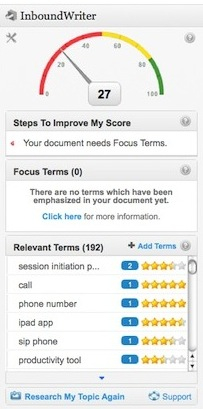Friday morning I received a product tour of a very usable and useful SEO web service called InboundWriter. The name says it all. This San Francisco-based startup has a WordPress plug-in that gently guides non-technical creative types in boosting the visibility of their oeuvres under various SEO and marketing scenarios. But SEO doesn’t quite cover InboundWriter’s total powers.
It’s optimization process starts with a research phase in which blog content is compared against a sample of other documents that are in IW’s cloud. You’re then returned a list of related phrases and concepts, which can be a treasure trove for writers as they follow links to new source material. Other services may perform what appears to be a similar type of analysis, but this is usually a trawl of web sites based on a raw keyword search.

More work needed to optimize this post
InboundWriter’s research step, from what I could understand, is a sophisticated natural language analysis of the text. Or perhaps it’s more of a statical analysis based on, say semantic indexing? In any case, as a blogger, I’ve been on the hunt for a tool that could do something like this–so kudos to InboundWriter.
But that’s just the first part of this writerly service. SEO suggestions are based on an analysis of keyword popularity, which is also returned in the list as a one to five star rating. You have two basic strategies–either to optimize for highly crowded and expensive keywords, or to work the long tail, focusing on less popular words.
In either case, once you’ve picked the word or phrase to optimize, you’ll generally need to increase its density usage to create a “focus” term. InboundWriter expects focus terms to appear at least 5 times in a post. In my test post, I had no problem salting my text with the focus word I chose. Though I did notice that the software didn’t seem to count possessive forms.
InboundWriter’s next phase kicks in. You’re now given a series of tips about focus word placement.
For anyone that’s ever worked with expensive SEO search consultants, InboundWriter’s optimization advice should sound familiar–i.e., move focus words to the title or H1 tag, and have them appear in the first sentence as well. In their freemium model, this costs you bupkes.
As you add new focus words–IW suggests at least two–and tweak the copy, an SEO speedometer shows your current level of performance. In my sample blog, I was able to accelerate up to about 80 (100 is the maximum).
For each WordPress post that’s published, InboundWriter puts their badge at the end of your content. They also have a web page service that works similarly, but limiting you to 8 pages per month. For unlimited usage and no advertising, you pay $19.95.
Considering that most small businesses, and especially independent writers and other solo types are pretty clueless–as are the rest of us, to be truthful–about Google and can’t afford expensive SEO consulting, InboundWriter serves its niche well.

